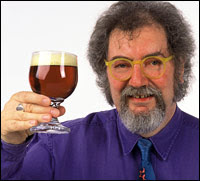http://espn.go.com/new-york/story/_/id/ ... s-one-kindWant to hear a funny thing about Bert Sugar? I never saw him without a cigar in his mouth.
And I never once saw him light it.
Oh, it would always be there, clenched in his teeth or pushed off to the corner of his mouth so he could unleash the smile that was never far from his face. The end would grow soft and gelatinous and repulsive looking -- he would withdraw it rather frequently to allow room for a sip of his favorite beverage, generally a scotch and water -- but the damned thing never got any shorter, because in the 30 years that I knew him I never saw it lit.
That's what makes it even harder to take, the news that this bon vivant and raconteur, a lover of all things obsolete and a uniquely New York character, had died from cardiac arrest after a battle with lung cancer at the age of 75.
That cigar was as much a part of his persona as the hat that was always on his head, and the joke that was always on his lips.
In the 30 years that I was lucky enough to call him a friend, I saw him without that hat only twice, and I saw him angry only once, an event directly connected with the (forcible) removal of that hat, but more about that later.
When famous people, men, die we love to say, "There will never be another one like him," but in Bert Sugar's case, I'm pretty sure it's true.
Because if Bert Sugar hadn't invented himself, it would have been impossible for anyone else to invent him.
He was a brilliant guy, with a law degree from the University of Michigan, and as he loved to remind everyone, that was the last bar he ever passed. Instead of making a living as a lawyer, he chose to become a professional character, an expert on things most people either no longer think are important or, even worse, never knew about to begin with.
And he may well have been the last of a breed, that typically New York wiseguy who possessed one priceless and seemingly vanishing skill: The ability to tell a story at a bar. There was a time when this was an essential talent for anyone drawing a paycheck as a journalist, because at heart, we're all supposed to be storytellers.
But what the new breed lacks, despite having its noses buried in an array of electronic devices and a full slate of "platforms" upon which to express the most trivial thoughts, is the ability to communicate on a one-to-one, eye-to-eye, interpersonal level.
These days, there's a plethora of "social media" and a dearth of real socializing.
And socializing was what Bert Sugar -- no one but his publishers used his middle name, "Randolph" -- was all about.
He was most closely identified with boxing, a subject he wrote nearly 100 books about, but he had a voracious interest in a variety of subjects, from baseball to vaudeville acts to thoroughbred racing to the comparative merits of Groucho Marx vis-a-vis W.C. Fields.
He could sing all the words to "Lydia the Tattooed Lady," trace the lineage of every heavyweight champion back to John L. Sullivan, and explain how Houdini did his famous Water Torture Escape.
Clearly, this was not his world anymore.
But when it was, the world was a better place when Bert Sugar was around. He was a laugh-a-minute, a drink every two minutes, and a lot of bartenders in this area, like those at O'Reilly's and Runyon's and Gallaghers and P.J. Clarke's and the Irish Pub in Atlantic City are going to feel his passing as much as his many friends in the businesses of boxing and journalism and show business.
Even though I was 20 years younger than him, he always called me "Uncle Wally." I never knew why and I never asked him. I didn't care. I liked it. It meant I was one of his guys. We liked the same things, drank the same booze, laughed at the same jokes, spoke the same language. I will miss him terribly.
There are libraries and retirement homes all over Long Island that will miss Bert Sugar, too, because if you were his friend and he wrote a book -- and he must have written a couple hundred -- he wouldn't send you a copy. He'd send you six. And a few weeks later, he'd send you six more.
I'd always keep the one he inscribed to me and donate the rest. There's a ton of Bert Sugar books formerly belonging to me now being read by senior citizens all over the metropolitan area.
In fact, a few years ago he asked me to write a chapter for a whimsical compilation he put together called "I Hate the Dallas Cowboys, And Who Elected them America's Team Anyway?" and I still have about a dozen brand-new copies sitting on my shelf. So if anyone needs one, let me know.
Bert cranked out books the way some of us crank out columns. He wrote one about as frequently as a lot of us tweet. Some of them were pure hackwork, compilations of other people's work with a tacked-on introduction.
Some of them were inspired fun, like his beloved books of lists. My personal favorite of those is his modestly-titled, "The 100 Greatest Athletes of All Time," which starts predictably enough: No. 1, Jim Brown. No. 2, Jim Thorpe. No. 3? The Babe.
But not Babe Ruth. Babe Didrikson Zaharias. Think that started an argument or two?
And that, also, is what Bert Sugar was all about, stimulating conversation, discussion, dispute. He did a handful of those "list" books, and a few more serious ones, like the autobiography he co-wrote with the late Angelo Dundee, or the biography of Muhammad Ali he collaborated on with the late Jose Torres, "Sting Like a Bee," which contains some of the sharpest analysis of a boxer's psyche I have ever read.
He will be remembered for that one, but most of all, for being one of the first sports-specific commentators whose persona was almost as important as his expertise, a guy who understood the value of being a "character" before the media suits hiring him even understood it themselves.
But when you switch on a sports-talk channel today and see one of the ever-present blowhards, each of whom inhabits a specific persona either self-created or imposed upon them by some "innovative" producer, remember that Bert Sugar wrote the book on that, too.
He was never seen without his hat, and there was a reason which I suppose is safe to reveal now: He was follicly challenged up top. He refused to doff that fedora, even when the national anthem was playing at ringside; he would bow his head forward and tip the brim downward.
But I saw him without it once when I returned to my hotel room early and caught him coming out of the shower in only a towel -- I had allowed him to use my room to change into his tuxedo before a boxing awards banquet -- and again at the Irish Pub when a woman, having taken advantage of his generosity at the bar and his general good nature impulsively snatched it off his head, and the second time was the only time I saw Bert Sugar get angry.
In his violent effort to keep his jealously guarded secret from being revealed, he knocked over the table, spilling everyone's drinks. He stormed out into the night -- but returned a moment later, calm and smiling and apologetic. And, of course, buying a round for everyone in the place.
In writing this column, I pulled one of his books off my shelf -- "Bert Sugar on Boxing," one of his compilation jobs -- and re-read the inscription:
"Here's my latest offering -- "The Best of Bert Sugar, The Worst of Bert Sugar, and What the Hell's the Difference?"
Once again, he was right. There was no real difference, because with Bert Sugar, it was all good, all the time.
RIP

